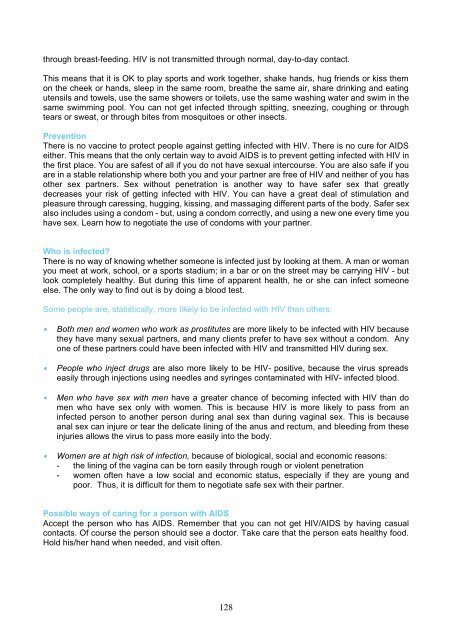manual: women workers' rights and gender equality - International ...
manual: women workers' rights and gender equality - International ...
manual: women workers' rights and gender equality - International ...
You also want an ePaper? Increase the reach of your titles
YUMPU automatically turns print PDFs into web optimized ePapers that Google loves.
through breast-feeding. HIV is not transmitted through normal, day-to-day contact.<br />
This means that it is OK to play sports <strong>and</strong> work together, shake h<strong>and</strong>s, hug friends or kiss them<br />
on the cheek or h<strong>and</strong>s, sleep in the same room, breathe the same air, share drinking <strong>and</strong> eating<br />
utensils <strong>and</strong> towels, use the same showers or toilets, use the same washing water <strong>and</strong> swim in the<br />
same swimming pool. You can not get infected through spitting, sneezing, coughing or through<br />
tears or sweat, or through bites from mosquitoes or other insects.<br />
Prevention<br />
There is no vaccine to protect people against getting infected with HIV. There is no cure for AIDS<br />
either. This means that the only certain way to avoid AIDS is to prevent getting infected with HIV in<br />
the first place. You are safest of all if you do not have sexual intercourse. You are also safe if you<br />
are in a stable relationship where both you <strong>and</strong> your partner are free of HIV <strong>and</strong> neither of you has<br />
other sex partners. Sex without penetration is another way to have safer sex that greatly<br />
decreases your risk of getting infected with HIV. You can have a great deal of stimulation <strong>and</strong><br />
pleasure through caressing, hugging, kissing, <strong>and</strong> massaging different parts of the body. Safer sex<br />
also includes using a condom - but, using a condom correctly, <strong>and</strong> using a new one every time you<br />
have sex. Learn how to negotiate the use of condoms with your partner.<br />
Who is infected?<br />
There is no way of knowing whether someone is infected just by looking at them. A man or woman<br />
you meet at work, school, or a sports stadium; in a bar or on the street may be carrying HIV - but<br />
look completely healthy. But during this time of apparent health, he or she can infect someone<br />
else. The only way to find out is by doing a blood test.<br />
Some people are, statistically, more likely to be infected with HIV than others:<br />
• Both men <strong>and</strong> <strong>women</strong> who work as prostitutes are more likely to be infected with HIV because<br />
they have many sexual partners, <strong>and</strong> many clients prefer to have sex without a condom. Any<br />
one of these partners could have been infected with HIV <strong>and</strong> transmitted HIV during sex.<br />
• People who inject drugs are also more likely to be HIV- positive, because the virus spreads<br />
easily through injections using needles <strong>and</strong> syringes contaminated with HIV- infected blood.<br />
• Men who have sex with men have a greater chance of becoming infected with HIV than do<br />
men who have sex only with <strong>women</strong>. This is because HIV is more likely to pass from an<br />
infected person to another person during anal sex than during vaginal sex. This is because<br />
anal sex can injure or tear the delicate lining of the anus <strong>and</strong> rectum, <strong>and</strong> bleeding from these<br />
injuries allows the virus to pass more easily into the body.<br />
• Women are at high risk of infection, because of biological, social <strong>and</strong> economic reasons:<br />
- the lining of the vagina can be torn easily through rough or violent penetration<br />
- <strong>women</strong> often have a low social <strong>and</strong> economic status, especially if they are young <strong>and</strong><br />
poor. Thus, it is difficult for them to negotiate safe sex with their partner.<br />
Possible ways of caring for a person with AIDS<br />
Accept the person who has AIDS. Remember that you can not get HIV/AIDS by having casual<br />
contacts. Of course the person should see a doctor. Take care that the person eats healthy food.<br />
Hold his/her h<strong>and</strong> when needed, <strong>and</strong> visit often.<br />
128

















